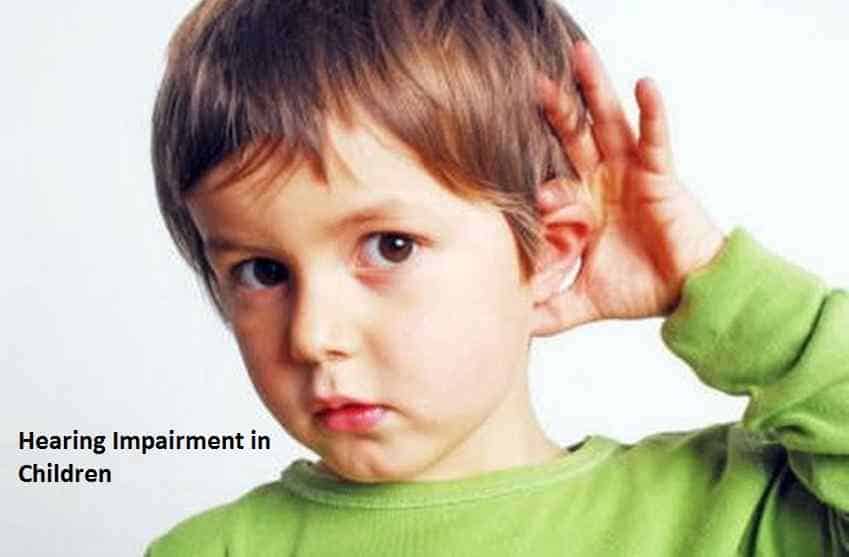Hearing loss in children is a dangerous condition. If you ever felt that your kid is not responding to your instructions or asks to increase the volume of TV or radio, it is high time you should consult a reliable ENT specialist. The primary causes of hearing impairment in children are genetic defects in the fetus, earwax, and ear infection. Untreated hearing issues can obstruct the child’s verbal, emotional, and social development. You can find out your kid’s hearing issues right after birth or at a later stage.

Table of Contents
What Causes Hearing Impairment in Children?
Here are some common causes of hearing impairment in children:
- Otitis Media – This is a typical middle ear infection that is common with young children due to Eustachian tubes. It happens when the tubes that connect the nose and the middle ear are not entirely formed. It leads to fluid production behind the eardrum and resulting in an infection. Most of the time, the child may not experience any pain or uneasiness in the ear; still, this fluid can impact the If left unattended, this can lead to a permanent hearing loss.
- During Birth – Many children are born with hearing impairment. In the majority of the cases, the genes of the child are to be blamed for this. Other causes can be carelessness during prenatal care or pregnancy. If a woman has preeclampsia or diabetes, the child can develop hearing issues. Premature babies are also vulnerable to this disorder.
- Injury or Illness – Some harmful diseases like chickenpox, measles, flu, encephalitis, and meningitis can give rise to hearing inabilities. Not only this but, exposure to excess loud noise, head injuries, and some specific medications can also lead to hearing impairment in children.
- Nervous Disorder – Any nervous disorder in the child can develop hearing issues at later stages. You should consult an experienced neurosurgeon and ENT specialist to understand the available treatment options for you.
- Medications during pregnancy – Many times, pregnant ladies suffer from medical issues that require the consumption of antibiotics and pain relievers. Ototoxic drugs can damage the hearing structures or auditory nerve of the fetus.
- Infections during Pregnancy – Many women suffer from herpes simplex, German measles, cytomegalovirus, or toxoplasmosis during pregnancy. It could result in hearing issues in the child.
- Other Causes – Other causes of hearing impairment in kids can be smoking or consumption of alcohol by the mother during pregnancy. Every pregnant woman is advised to stay away from alcohol and tobacco to avoid severe complications later on.
Symptoms
Here are some common signs of hearing impairment in children:
- Absence of any reaction to loud noises
- Lack of responsiveness to regular voices
- Inability to understand the instructions
- Being continuously cranky for no reason
- A complaint of ear pain
- Suffering from a fever
- Keeps increasing the volume of TV and radio
- Lack of energy
- Lack of attention
- Continually rubbing or pulling an ear
Types of Hearing Ailments
There are three types of hearing ailments; Conductive hearing loss, Sensorineural hearing loss, and mixed hearing loss.
- Sensorineural Hearing Loss – This is one of the most common types of hearing ailment. This condition occurs when the inner nerves of the ear are wholly damaged and fail to transmit the sound signals correctly to the brain. It is caused by the crushing of hair cells in the ear, medications, or damage due to loud noise.
- Conductive Hearing Loss – It is a condition that arises due to the hindrances in the middle or outer ear, preventing the sound from entering the ear. The child may experience distorted or fainted sounds. The good news is this can be treated surgically or medically.
- Mixed Hearing Loss – This condition is a mix of the above two types of hearing ailments.
6 Warning Signs that you need to consult an ENT Specialist
Here are the top 6 signs that need immediate attention from an ENT Specialist!
- When your child fails to tell from where the noise is coming
- When your child gets uncomfortable when sound is coming from one side of the ear
- When he is watching others for imitating their sounds and actions at home or in school
- When your child is continuously rubbing his or her ears
- When your kid is tired consistently and show a lack of interest in talking
- Any signs of tinnitus, vertigo, or abnormal sensation in the child’s ears
What to expect from your ENT Doctor?
Most of the time hospitals check the newborn’s hearing abilities before they are discharged. While other hospitals only do a check-up on receiving any problem of a parent. Consult your doctor to know more about this procedure. There are various treatment options for hearing impairments in children like medications, hearing aids, implants, and surgery to implant ear tubes.
You will be the first person to identify some unusual symptoms in your child’s hearing pattern. Early detection can help your child in regaining his hearing abilities up to a certain extent. As a parent, you should be well-informed about this condition and help your child in overcoming it. Stay connected to your child to understand his problems and with an experienced ENT specialist for regular follow-ups.


